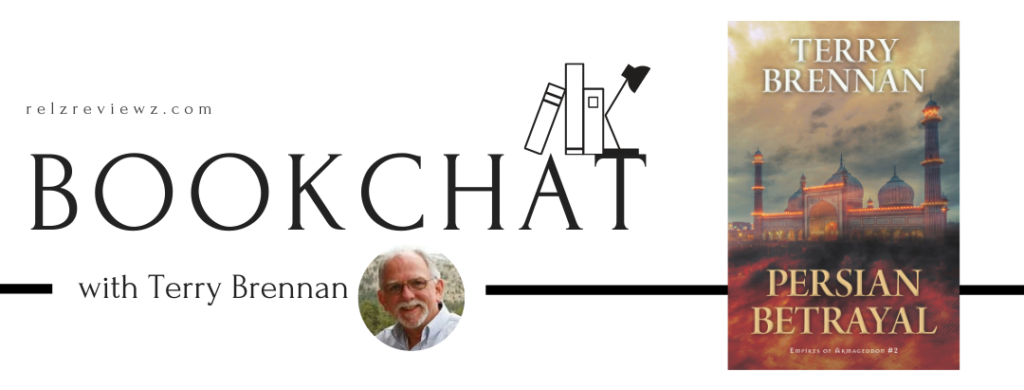
Terry Brennan’s Empires of Armageddon is an end time series destined to take your breath away. The second book in the trilogy, Persian Betrayal, released in July and readers can soon read the final instalment, Ottoman Dominion, when it releases in November.
Terry has provided detailed insights regarding Persian Betrayal and this series in our bookchat today and anyone with a particular interest in End Times novels will be fascinated. I know my dad will be very keen to read these novels!
Thanks to Kregel, we have a copy of Persian Betrayal to give away so make sure to enter below!
Over to you, Terry…
Bookchat with Terry
How much can Brian Mullaney risk to serve God and save lives–without losing his own?
DSS Regional Security Officer Brian Mullaney has been tasked with an incredibly dangerous mission. When a synagogue in Jerusalem is destroyed by an explosion, burying the second key prophecy Mullaney is hunting–and the deadly box that protects it–the answers he desperately needs are also crushed. How can he discover the meaning of the centuries-old prophecy now? Why are he and the ambassador he’s assigned to protect being targeted? And is there any way this lone man can thwart a nuclear arms race between three ascendant empires of the past?
An otherworldly servant of evil known only as the Turk is maneuvering all three nations into an intricate dance designed to undermine prophecy about the end times. And he won’t let Mullaney or anyone else get in his way.
Wounded in a bloody shoot-out, pressured by his wife to come home, and mourning the death of his best friend, Mullaney doesn’t need a powerful enemy. Who is he to save the Ishmael Covenant, the treaty promising peace in the Middle East? Despite angelic intervention, Mullaney wants nothing to do with his final assignment. But without him, evil will win the ultimate struggle . . . and humankind will have no hope left.
Share a little about your leading man, Brian Mullaney
Brian Mullaney is a man faced with multiple crises.
His 19-year career in the US State Department’s Diplomatic Security Service (DSS) is threatened, his marriage is in tatters, and he’s struggling to deal with the recent death of his father. Mullaney’s faith is being severely tested.
Universally known for his character and integrity, Mullaney is determined to do his duty, but just as determined to get back to Washington as soon as possible to rescue his marriage. What he didn’t expect was to find himself in the middle of a titanic battle between good and evil, hunted by an other-worldly agent of death, known only as the Turk.
Mullaney is unjustly pushed out of Washington and assigned as Regional Security Officer for the Middle East – overseeing the security of all US Foreign Service personnel in the region. More specifically, Mullaney is also responsible for the security of Joseph Atticus Cleveland, the new US Ambassador to Israel.
Normally calm in demeanor, with ever-watchful, knowing eyes, Mullaney is 43-years-old but already has wisps of grey at the temples of his thick, black hair. Bright and articulate, Mullaney is a commanding presence at six-feet-two and two hundred and twenty-five pounds and has been a highly regarded officer throughout his DSS career.
But he finds himself in Israel alone.
Abigail Mullaney moved eleven times during their marriage, following Brian’s assignments around the world. The constant upheaval was acceptable, for a time. But the last few years they have drifted apart. Now Mullaney has broken his promise that they would set down roots and make a permanent home in the DC suburbs. Abby and her daughters remain in the States when Mullaney is wrongly banished to Israel.
So, Mullaney is a man of many trials … a man of duty pulled in opposite directions by two competing oaths.
Why do you write suspense thrillers?
These are the kind of books I read in my youth and have continued to read, even now. I enjoy reading novels of all kinds. A literary novel that is well done is a treasure. But if I had a choice, I would read or write a suspense thriller, a book of action and adventure; a book of high stakes and world-wide scope. I guess it’s just the way I’m wired.
This series focuses on the End Times – how do you go about researching those aspects?
Two of the themes that drive this series are, first, the theme of spiritual warfare and, second, how that spiritual warfare plays out on the world stage.
My personal Bible is a 1985 version of the NIV Study Bible given to me by my wife. The Study Bible has in-depth explanatory notes on nearly every page. In reading the book of Ephesians, I came to the line in Ephesians 1:3 where Paul mentions “heavenly realms” for the first of five times in the book. This is part of what the NIV study note says:
“… in the Christian’s union with the exalted Christ, ultimate issues are involved … At stake are God’s eternal eschatological purpose and the titanic conflict between God and the powerful spiritual forces arrayed against him …. As a result, the spiritual struggles of the saints here and now is not so much against ‘flesh and blood’ as against the great spiritual forces that war against God in heaven.”
I hope that readers of the empires of armageddon series come to understand that Christians are in a real, tangible war here on earth and that they are part of the “titanic conflict between God and the powerful spiritual forces arrayed against him.” I was struck by the idea that there are great spiritual forces that war against God in heaven. Interesting thought. More sobering is the idea that my ‘spiritual struggles’ here on earth have, in some way, an impact on that war in heaven.
It was Pastor Nick Uva, of Harvest Time Church in Greenwich, CT, who first introduced me to the Vilna Gaon and his prophecies. And I’ve been harboring a belief that three ancient empires of the Middle East – Persian, Ottoman and Islamic – are about to rise again. And how the conflict of these ascendant empires could impact world history, and our future.
I am far from a theologian or a student of eschatology. But if you mix all those ideas together, and do a lot of research, online and in libraries, you might come up with Brian Mullaney in a very real, life-or-death conflict with evil incarnate … eternal created beings determined to destroy Mullaney before he discovers their intention. Which is to thwart a Messianic prophecy and thereby change the end of the Bible. Mullaney’s enemies are determined to change the outcome of the battle of Armageddon and the coming judgment.
And that’s how I found myself in the “end times”.
Describe your book in 5 adjectives
Riveting
Epic
Breathless
Cliff-hanger
Sleep-depriving
Share a favourite line or passage from Persian Betrayal.
This is from Chapter 30:
The little man with the round face and inquisitive eyes had opened the door to a place where Mullaney had stashed all his fears. Was he good enough to be the guardian? Did he deserve to be given this anointing? Was he worthy? Was he able?
“You’ve got to be kidding. I can’t do that,” he said. “Not just because—”
Herzog held up his hand as a stop sign. “I know. You are reluctant not because my son perished carrying the anointing. It is not physical fear that attacks your confidence. You are reluctant because you doubt your worth. Is that not true? Why you? I know, believe me, I know. Because that same fear I felt, the same sense of unworthiness—even when a giant angel put his hands on my head, his huge wings unfurled, and spoke the Aaronic Blessing over me.”
The rabbi leaned forward, his voice betraying the depth of his concern. “You have come face-to-face with evil these past few days. Not just bad men out to do evil. But evil itself. The same evil that killed my son and so many others. But you have also felt the touch of angels, I think.
“Angels, though created on a lower level than mankind, are immortal, their bodies don’t suffer from pain and sickness. They are smarter, faster, stronger. They are not infinite . . . only God is infinite. And he makes all the rules, so he can wipe out angels—all angels—anytime he desires. And they don’t have God’s nature. They are not omniscient nor omnipresent. They are finite, supernatural beings.
“To us,” said Herzog, “angels look like superheroes. And in many ways they are. But there are good superheroes and there are evil superheroes. I certainly don’t understand it all. But I can tell you that super evil has been unleashed to try and thwart the purpose of the Gaon’s prophecies. I believe we have yet to understand the ultimate purpose of his messages. But I also believe that super evil has sought to destroy the prophecies since they were first written over two hundred years ago, and super evil has persisted in its attempts to destroy the prophecies—and the men who have been anointed as guardians of those prophecies—right up until the present. So I am not surprised to find good superheroes . . . angels . . . working on our behalf.
“But Agent Mullaney, why . . . why now? Why this prophecy, this box of death, this supposed peace with the Arabs and the unleashing of this evil, all at the same time? About that have you wondered?”
This time Mullaney didn’t hesitate. If he was going to get an answer in, it had to be quick. “Only in my sleep, and there’s been precious little of that,” he said. “The last few days, I haven’t had much time to think about why things are happening. Too many people have died, and the ones responsible for those deaths are still out there, waiting, ready to try again.” Mullaney could feel the level of his agitation rising. He got out of his chair, turned, and looked out the window. The day’s heat was beginning to penetrate the glass. “I’m just trying to keep those people around me alive,” he said, his comments as much for himself as for Herzog. He turned back toward the rabbi. “Which is another reason why I don’t think I can take on this guardian role that you and your angel want to put on my shoulders. Wherever that box goes, the crazies go, too.”
Rubbing his chin with his left hand, Herzog opened the palm of his right hand toward Mullaney. The envelope was still between his fingers. “So . . . you care not to know this message?”
When you began writing this series, did you already know how it is going to end?
I believe there are only two types of authors – architects and gardeners. Some build it all (summaries; biographies; chapters) before they start, some plant a seed, water it, let the sun shine and see how it grows. I’m a gardener.
This series started with one idea, one seed: The idea that three ancient empires were once again about to rise in the Middle East. Everything else grew from there. So, I knew the titles of the books, the names of the characters and had a vague idea of the plot line. But as my editor can readily attest, I had no idea what I was doing, and little idea how it would end up.
And I’ll let you in on a secret. I didn’t figure out the ending of the series until I was more than halfway through book three.
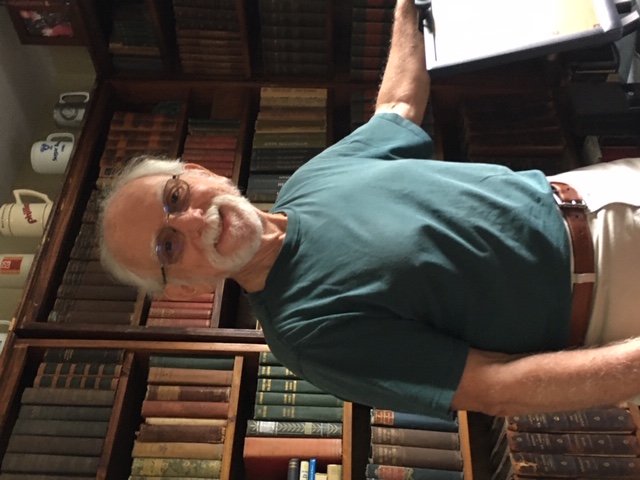
Which character did you enjoy writing most?
You may get a clue from above, but my favorite character is Rabbi Mordechai Herzog, a wizened old rabbi who brings great wisdom—and significant comic relief—to the story. I gave Rabbi Herzog an occasionally different cadence of speech and sentence structure which helped establish him as a unique “character.” But it was his good-natured perplexity, off-handed humor and his determination not to be left out of the “fun” that made him a memorable and enjoyable character to write.
There is another character, Ruth Hughes, who has an interesting story behind her. On a speaking engagement in Florida, I held a drawing. The winner would have their name used as one of my characters. Tina won, but asked if I would use her mother’s name, Ruth Hughes. My character is a smart, strong, accomplished, no-nonsense career woman, former corporate counsel and board member of Aramco, the Saudi/US oil giant. I sent Tina some scenes I had written for the character of Ruth Hughes. She wrote back and said, “That’s just like my mom!” The real Ruth Hughes was honored as one of Detroit’s Top Ten Working Women, was listed in Who’s Who of American Women, nominated to be president of Detroit’s ACLU and is on the World War II commemorative wall of Chrysler Engineering in Washington, DC. Pretty cool, eh? You can find the full story in the “Author’s Notes” at the end of each novel in the series.
Which character gave you the most grief?
There were two, for the same and different reasons.
Ambassador Joseph Atticus Cleveland is a black man. Great grandson of a man who was born a slave, Cleveland has enjoyed an exemplary thirty-year career in the US Foreign Service. He’s been honored and revered by presidents, kings and prime ministers.
Noah Webster is also a black man, half African-American, half Caribbean. Political power pushed Webster into his lofty position in the US State Department, and his ruthless determination to seize his own wealth and power has kept him there.
One a hero; one a villain. Both black. I’m not black. My greatest challenge was if I could write these two very different characters—one a saintly gentleman and the other an evil man driven by hate—and make them real to the men in this, and other countries, who live with a different reality than I do … what it’s really like to be a black man in America.
I’m indebted to my son-in-law, Azizi, who for the last ten years has helped me get a glimpse of his life experiences, which are so much different than mine. And to my daughter, Meghan, who has walked in his life with him for the past decade. I’ve also learned from authors Ta-Nehisi Coates and Colson Whitehead. And was deeply moved by Brian Stephenson’s Just Mercy.
For their sakes, I hope I did a good job.
Can you share a peek into Ottoman Dominion?
The series starts in 2014 when a prophecy written in 1794 by the Vilna Gaon (who was a real person) was actually revealed. In my fiction, I invented a second prophecy from the Gaon that has been hidden in a bronze box for more than 200 years. Anyone who touches the box without the anointing dies a gruesome, immediate death.
In Ottoman Dominion, Brian Mullaney is anointed as the final guardian of the box of power which, we now find, has a mission and a purpose of its own, outside of protecting the prophecy. As Mullaney’s life-or-death struggles with a cadre of murders serving the Turk intensifies, his faith is stretched to the breaking point when he discovers the true purpose of the box of power … and the true intentions of the demonic powers opposing him. And, of course, it all ends up in a “titanic battle.”
How have current events impacted the writing of this series?
If you look at the recent history of the Middle East, it’s not a far stretch to predict that three ancient empires are on the cusp of emerging once again. Iran and Iraq are both nations where the Shia sect of Islam is dominant. Ever since Saddam Hussein’s Sunni-led regime was overthrown in Iraq, Iran and Iraq have moved inexorably toward unifying as a rebirth of the ancient Persian Empire. The leaders of Turkey have voiced neo-Ottoman rhetoric for years. More importantly, Turkey controls most of the fresh water in the Middle East and has steadily reduced its flow into the major rivers of the region—the Tigris and Euphrates. And the Arab states of the Saudi peninsula are as frightened of Iran’s nuclear intentions as is Israel. The Saudi kings actually bankrolled Pakistan’s nuclear weapons initiatives with, many believe, an understanding that Pakistan will deliver nukes to Saudi Arabia if asked. A nuclear-armed Islamic Empire is conceivable, if only to thwart the Persians.
Then, a funny thing happened on the way to fiction. Reality stepped in.
I started writing the Empires of Armageddon series in 2015. The first book, Ishmael Covenant, took me two years to complete with another year of editing (we were really editing the entire series), and it was released in February 2020. One of the early plot drivers of the series is that the Islamic nations along the Persian Gulf—Saudi Arabia, Oman, Kuwait, United Arab Emirates—join with Jordan and Egypt to enter into a peace treaty and mutual defense pact with Israel. The treaty is called the Ishmael Covenant. The Arab nations are driven into this unexpected alliance because they fear Iran and its quest for nuclear weapons more than they hate the Jews.
Six months after Ishmael Covenant was released, in a joint communique, US President Trump actually announced on August 13, 2020, that the United Arab Emirates and Israel had entered into a peace treaty that would normalize relations between the two countries. This treaty agreement is being called the Abraham Accord. UAE became the first Arab nation to agree to a peace treaty with Israel since Anwar Sadat led Egypt in signing the Camp David Accords in 1979.
Ishmael Covenant? Abraham Accord? Sounds pretty similar to me. I think this series may be predicting tomorrow’s headlines.
Whose novels do you enjoy reading?
Joel C. Rosenberg, of course. I think I’ve read every book Rosenberg has written and keep looking forward to the next one. But I enjoy more than just Middle East thrillers.
For something really different, I’ve loved all three novels written by Marilynne Robinson—Gilead, Home and Lila—that are a continuing story of faith and family relationships in rural America. I’ve read most of the books in the Charles Lenox series of mystery novels set in Victorian-era England, written by Charles Finch. Really enjoyed them all.
Another great story is All the Light We Cannot See by Anthony Doerr. And not long ago I finished a nonfiction book, Just Mercy by Bryan Stevenson that was eye-opening and is now very timely.
Thanks for the intriguing and detailed responses, Terry!
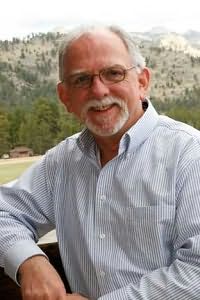
Terry Brennan is the award-winning author of The Sacred Cipher, The Brotherhood Conspiracy, and The Aleppo Code, the three books in The Jerusalem Prophecies series. His new book, Ishmael Covenant is the first in his new series, Empires of Armageddon.
A Pulitzer Prize is one of the many awards Terry Brennan accumulated during his 22-year newspaper career. The Pottstown (PA) Mercury won a Pulitzer Prize for Editorial Writing for a two-year series of editorials published while Brennan was the newspaper’s Editor.
Starting out as a sportswriter in Philadelphia, Brennan became an Editorand Publisher for newspapers in Pennsylvania, Illinois, and New York and in 1988 moved to the corporate staff of Ingersoll Publications (400 newspapers in the U.S., Ireland and England) as Executive Editor of all U.S. newspaper titles.
In 1996, Brennan transitioned into the nonprofit sector, spending 12 years as VP Operations for The Bowery Mission and six years as Chief Administrative Officer for Care for the Homeless, NYC nonprofits that serve homeless people.
Terry and his wife, Andrea, live in Danbury, CT.
Relz Reviewz Extras
Visit Terry’s website
Buy at Amazon: Persian Betrayal or Koorong
Facebook (Terry Brennan)
Twitter (@terrbrennan1)
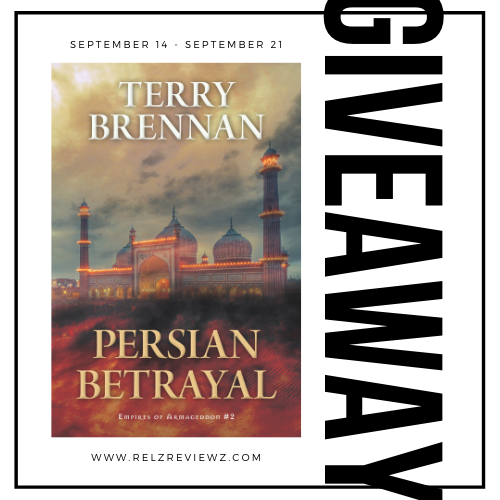

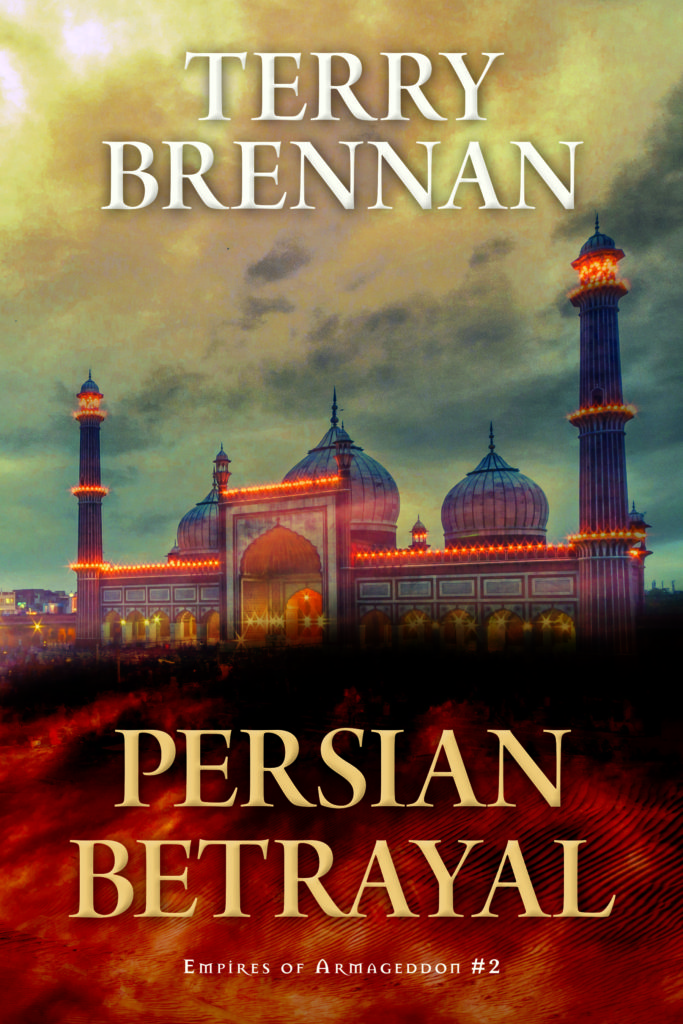
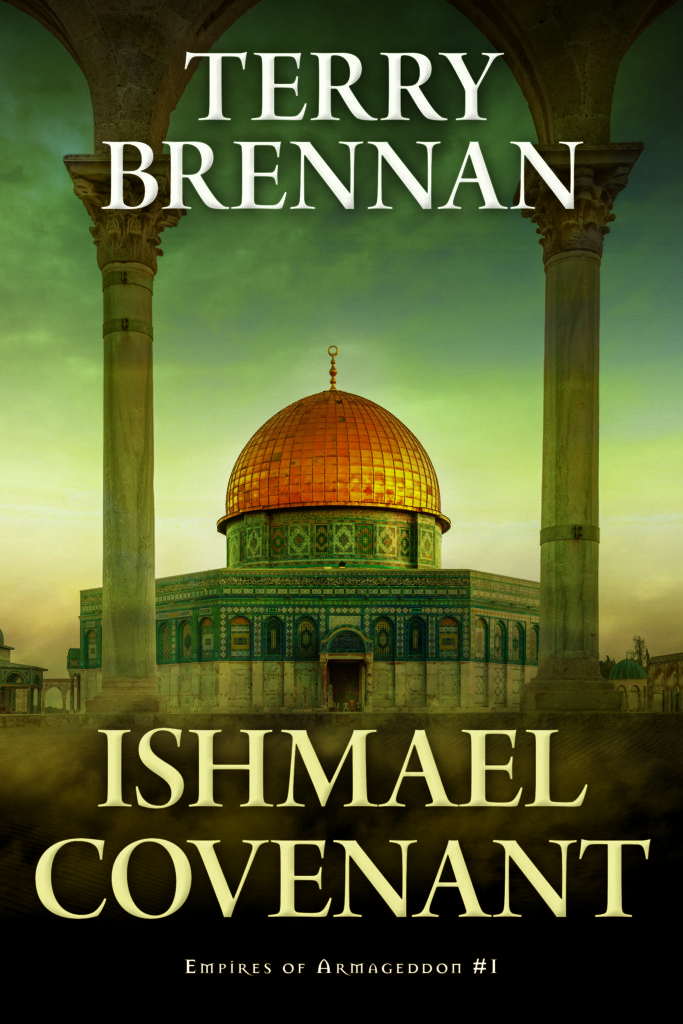
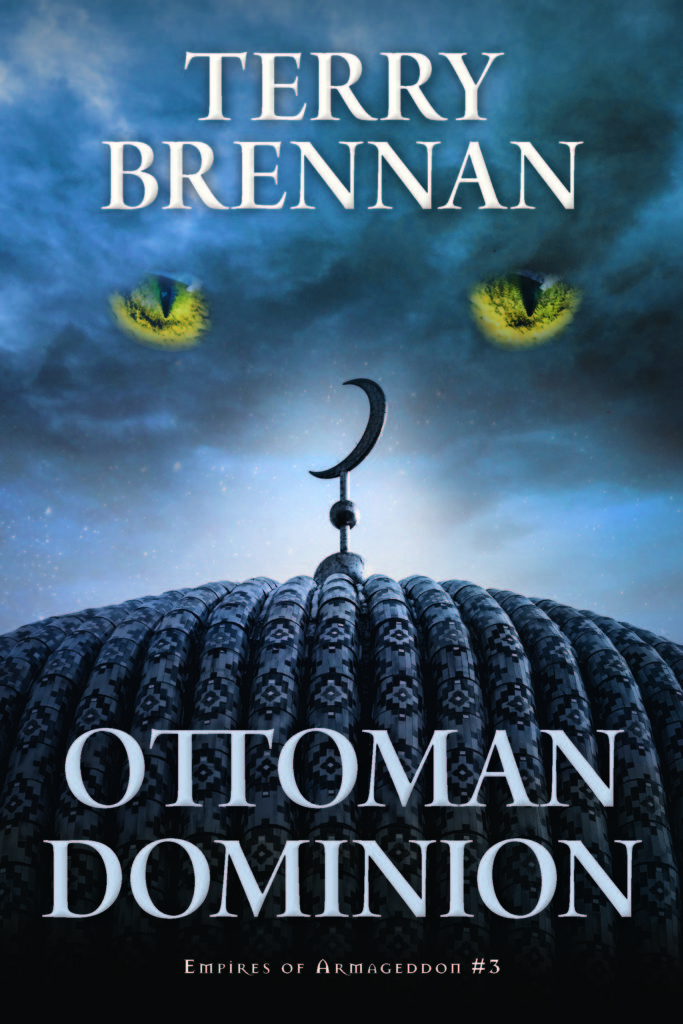



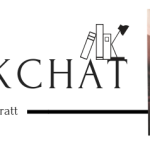

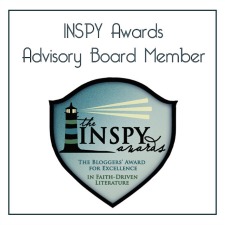




September 15, 2020 at 6:45 pm
I think it’s interesting how every author can write a very different tale regarding the end times.
September 16, 2020 at 11:45 am
That the Lord would partner with his church to govern on Earth.
September 18, 2020 at 10:51 pm
Looks like a fascinating series. “The spiritual struggles of the saints here and now is not so much against ‘flesh and blood’ as against the great spiritual forces that war against God in heaven.” Love books that help me see this reality.
September 28, 2020 at 11:52 pm
Thanks for your feedback. Hope you enjoy the series.